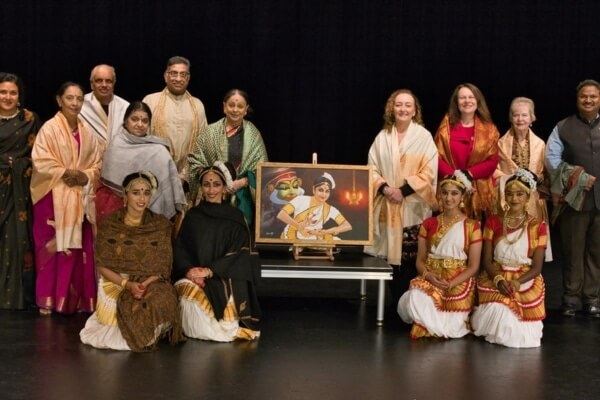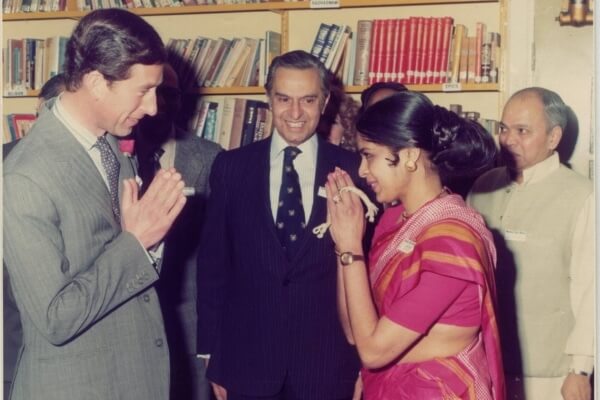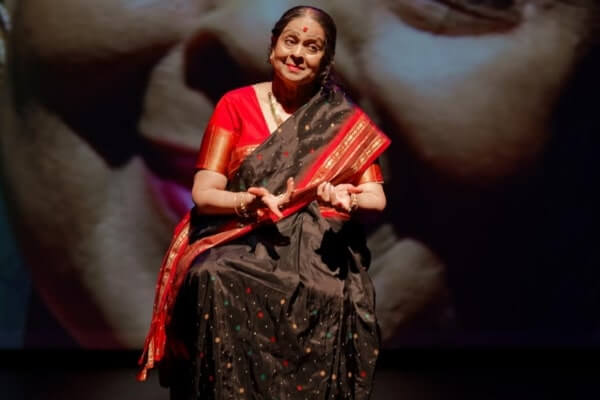It couldn’t have been a more fitting felicitation for Melbourne dancer and dance teacher Tara Rajkumar OAM as she marked 40 years in the field. Her peers in the city’s classical Indian dance community came together to honour her at a special event.
The occasion became the highlight of a 4-day gala held over the King’s Birthday long weekend by InconcertMusic, the performance wing of Sridhar Chari’s music school.
Tara Rajkumar of Natya Sudha, who has almost single-handedly elevated Mohiniyattam and Kathakali styles of dance to a level where most people in the Indian community and Melbourne audiences are aware of it.

Tara Rajkumar was one of the pioneers of classical Indian arts in Melbourne. She established her dance school Natya Sudha in 1986, after having taught in the UK between 1979 and 1986. She was the first in the Indian arts community to be bestowed with the OAM in 2009, and as a choreographer par excellence, she has been involved in several collaborations with Aboriginal art and ballet productions.
Tara was born in Kerala and is the daughter of T. M. B. Nedungadi, former chairman of Kerala Kalamandalam – the premier centre of Kathakali and Mohiniyattam. Not surprisingly, she began learning Kathakali at the tender age of four. She lived in many places in India and whilst in Delhi, studied under Guru Punnathoor Madhava Panicker at the International Centre for Kathakali (ICK). A disciple of three legends Kalamandalam Krishnan Nair, Kalyanikutty Amma and Mani Madhava Chakyar, Tara has a command of the art form and a breadth of knowledge of the Indian classical arts that few can equal.
The special felicitation event by InconcertMusic was held on Saturday June 8 at the Rowville Secondary College. Almost everyone who has been involved in some way with Tara’s epic journey was there to felicitate her, including Vasan Srinivasan of FIAV and FIMDV, C Srinivasan (formerly of the Victorian Multicultural Commission), veteran dance teacher and choreographer Shanthy Rajendran, and several others.
Sridhar Chari of InconcertMusic presented Tara with an oil painting of her by the Veena maestro Ramnath Iyer. Compliments galore flowed from Sonya Russel (the deputy mayor of Knox Council), Mary Doyle (Federal MP for Aston), and Professor Margaret J Kartomi (Head of Music at Monash University and Head of Chancery). Tej Krishen from the Indian Consulate in Melbourne praised the Indian diaspora and Tara in particular for keeping Indian classical arts alive so far from home.
The felicitation was followed by a short film on Tara Rajkumar produced by Vinod Mankara of M4TV productions, which traced her life as a dancer from the time of her tutelage under Guru Krishnan Nair, to Delhi, the UK and then to Australia.

This was followed by a Mohiniyattam dance presentation by some senior students of the Natya Sudha school – Nithya Gopu Solomon, Dharani Kommalapati, Abhi Jayam and Roma Narayan.
The first item was an invocatory dance on Lord Ganapati, followed by a Cholkettu – somewhat akin to alarippu in Bharatanatyam. The item on Rama svayamvara was so evocative and beautifully rendered by the dancers that it was a treat to watch. A padam came next – presented in the tradition of nangiar koothu, a style closely related to Kudiattam in Kerala. The stories for the Kudiattam performances are taken from the text Sree Krishna Charitam, and depict the life of Lord Krishna.
The live orchestra was led ably by Tara Rajkumar and Chandana Brijesh on the nattuvangam, with delightful vocals by Uthra Vijayaraghavan, Murali Kumar on the violin, Malathi Vasudevan on the Veena, Venkat Ramakrishnan on the mrudangam, and Pradush Narayanan on the Edakka, a drum very specific to the Kathakali and Mohiniyattam styles. It was an evening of exquisite dance and music.
In other events in the 4-day gala, audiences enjoyed performances by several Carnatic music vocalists including Sriranjani Santhanagopalan, Ranjani-Gayatri and instrumental music by the Mysore brothers on the violin, as well as Lalgudi GJR Krishnan and Vijayalakshmi’s violin duet, and a Hari Katha by Vishaka Hari.
READ MORE: IPAC: The timeless rhythms of India’s classical arts




